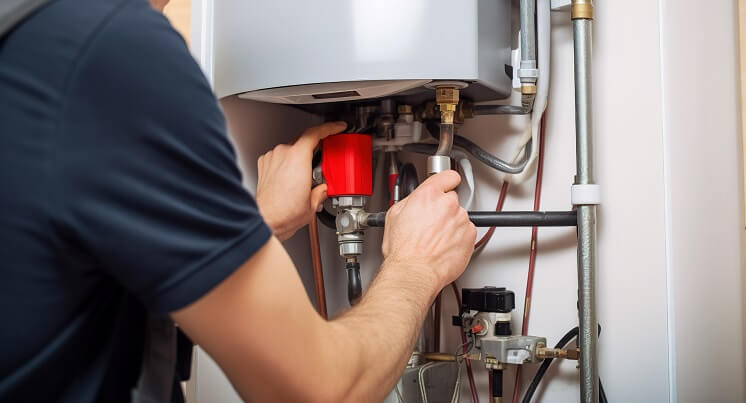Exploring Water Heater's Problems
Exploring Water Heater's Problems
Blog Article
This article following next on the subject of Common Problems with Your Home Water Heater is quite engaging. You should take a look.

Envision beginning your day without your routine warm shower. That already sets an inadequate tone for the remainder of your day.
Every home requires a reputable water heater, but only a few understand exactly how to manage one. One easy method to keep your water heater in top form is to check for faults frequently and fix them as quickly as they appear.
Keep in mind to switch off your hot water heater prior to smelling around for faults. These are the hot water heater faults you are most likely to come across.
Water also warm or too cool
Every hot water heater has a thermostat that determines how warm the water gets. If the water coming into your home is also hot regardless of establishing a practical optimum temperature, your thermostat might be damaged.
On the other hand, as well cold water may result from a failed thermostat, a damaged circuit, or incorrect gas flow. For instance, if you use a gas water heater with a broken pilot burner, you would certainly get cold water, even if the thermostat is in excellent problem. For electrical heaters, a blown fuse might be the perpetrator.
Not nearly enough warm water
Water heaters can be found in lots of dimensions, depending on your warm water needs. If you lack hot water before everybody has actually had a bathroom, your hot water heater is as well little for your family size. You should take into consideration setting up a bigger hot water heater tank or selecting a tankless water heater, which occupies much less space as well as is a lot more resilient.
Unusual noises
There are at least five type of noises you can speak with a hot water heater, yet the most usual interpretation is that it's time for the hot water heater to retire.
First of all, you should recognize with the normal sounds a water heater makes. An electrical heater might sound various from a gas-powered one.
Standing out or banging noises generally suggest there is a piece of sediment in your tanks, as well as it's time to clean it out. On the other hand, whistling or hissing noises might just be your shutoffs letting some pressure off.
Water leakages
Leaks could come from pipes, water connections, valves, or in the worst-case situation, the container itself. In time, water will corrode the tank, as well as locate its way out. If this happens, you need to replace your water heater immediately.
However, prior to your change your entire tank, be sure that all pipes remain in location which each shutoff functions completely. If you still need help determining a leakage, call your plumber.
Rust-colored water
Rust-colored water indicates one of your water heater components is worn away. Maybe the anode rod, or the container itself. Your plumber will certainly be able to identify which it is.
Warm water
Regardless of how high you set the thermostat, you will not obtain any warm water out of a heating unit well past its prime. A hot water heater's effectiveness may lower with time.
You will likewise obtain lukewarm water if your pipes have a cross link. This implies that when you turn on a tap, warm water from the heating system flows in together with regular, cold water. A cross link is very easy to area. If your warm water faucets still run after shutting the hot water heater shutoffs, you have a cross connection.
Discoloured Water
Corrosion is a major reason for unclean or discoloured water. Deterioration within the water tank or a stopping working anode pole can cause this discolouration. The anode pole shields the storage tank from rusting on the within and should be inspected yearly. Without a rod or a properly working anode rod, the hot water quickly wears away inside the container. Contact an expert water heater service technician to establish if changing the anode pole will certainly repair the problem; if not, replace your hot water heater.
Conclusion
Ideally, your hot water heater can last one decade before you require an adjustment. However, after the 10-year mark, you may experience any one of these faults more regularly. At this point, you must add a new water heater to your budget.
How To Troubleshoot 3 Common Water Heater Problems in Twin Cities
The Water Heater Is Leaking
A leaky cold water inlet valve A loose pipe fitting A leaky temperature and pressure relief valve A corroded anode rod A cracked tank Turn Off Your Water Heater:
Shut off your gas water heater by turning the gas valve on the unit to the “OFF” position. Shut off your electric water by switching its power off at your electrical panel. Look for a two-pole breaker labeled “water heater” and turn it to the “OFF” position. Move the ball valve connected to the water heater to be perpendicular to the piping at a 90° angle. Look for the Leak:
Depending on whether the water is coming from the tank's top or bottom, you’ll want to look for the leak in different locations.
If the leak comes from the top of the tank, carefully look for water escaping from the cold water inlet valve or loose pipe fittings. Rusted hot and cold water valves can have loose connections with the tank, with water leaking out of them.
https://mspplumbingheatingair.com/blog/how-to-troubleshoot-3-common-water-heater-problems
Hopefully you liked our article on Common Problems with Your Home Water Heater. Thank you so much for spending some time to read our content. Sharing is caring. One never knows, you may just be doing someone a favor. We take joy in reading our article about Common Problems with Your Home Water Heater.
Solve now, call! Report this page